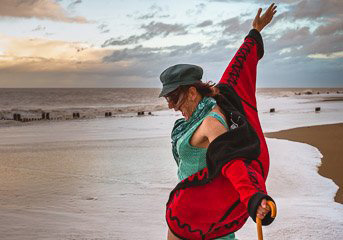Stunning in its rawness and honesty, Some Things Are Meant To Be, Anna is a celebration of life in the shadow of death. Penned by writer and dancer Gretel Brice, who is herself terminally ill, it’s fearless in confronting the brevity of our time on Earth – and in making peace with the inevitability of its ending.
At the centre of the story is Anna, who leads what is (to be candid) a vexatiously perfect life. Her kitchen walls twinkle in the sunshine; she has a garden by the sea; she’s sexually liberated, ‘doesn’t do queues’, and has two dynamic daughters to inspire her. But cancer doesn’t check anyone’s privilege, and deep inside Anna, cells are mutating and multiplying. By the time she detects any symptoms, it’s eaten up her ovaries. The prognosis comes as a hammer blow.
As Anna, Loraine Metcalfe’s performance is filled with intimacy and immediacy; she locks eyes with individuals in the audience, crouches down to address the front row. It’s exposing too, both emotionally and literally, for physical candour is an important theme of this piece. Through Anna, playwright Brice talks about things most of us wouldn’t dare to mention: the affinity she feels between her brain and her body, her deep sense of loss as her sex drive fades.
Metcalfe is accompanied on stage by Matilda Bailes and Alistair Jideofor, dressed in contrasting costumes but decorated with identical shimmering hearts. Both powerful physical performers, Bailes and Jideofor provide a welcome counterpoint to the monologue, expressing some emotions that perhaps could never be put into words. One particularly striking scene sees them grasp and tear at Anna, reflecting her anguish as the necessities of treatment peel away her very identity. Later, a tender dance conveys the slow goodbye to her daughters – filled both with heartbreak at the parting, and with hope for their future.
For there is hope here, through all the sadness. Anna believes in the survival of the human spirit – that in some sense, literally or metaphorically, we transcend the brief time we spend in our bodies. You may or may not agree with her philosophy, but you will surely be happy that it brings her peace, and the lesson for all of us is to find our own source of comfort when materiality fails.
This is a show which exists in the moment: in the time between life and death, between the start of a goodbye and the unavoidable final parting. There’s a tragedy at the heart of it, yet to say that it is tragic is to miss the point. Says Brice, through Anna: ‘With time so precious, I prefer to focus on the good stuff of today.’ It’s a moral that speaks to every one of us – wherever we are on life’s journey.
